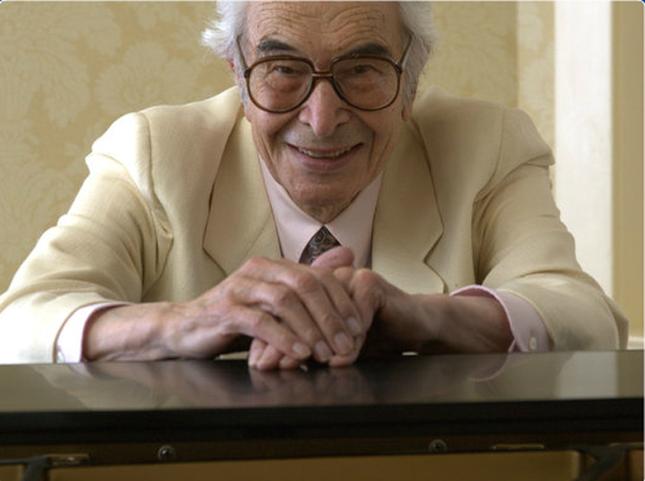Dave Brubeck: Solid, Regular Guy as Worldwide Jazz Genius
By • December 21, 2012 0 1600

Dave Brubeck was a giant in the world of jazz, a world noted for the presence of many giants and big personalities.
In that world, Brubeck was also a man apart, a true creative genius and original who didn’t live the troubled jazz lives of other jazz legends, Charlie Parker prominently among them. He was a pioneer like Parker was, a big world-like force like Louis Armstrong and a man nearly as influential in the range of American music that flowed from jazz as Duke Ellington.
Brubeck, who died just a day before his 92nd birthday last week, was the product of a Catholic marriage, was married to the same woman all his life, had six children, five of whom entered into what you could call the family business and was still creative, even touring, almost to the end of his days. This rock-solid man who looked somewhat like a mad professor and once wanted to be a veterinarian began a career as a jazz musician, group leader and composer after World War II, in which he had served honorably as well as performing for troops at the request of a commander.
Brubeck told people that his goal at the beginning was that he wanted to play polytonally and polyrhythmically — goals, the meaning of which might escape average boppers and listeners but which meant one word to Brubeck: freedom. It was complicated, but it opened up wide so that jazz contained the world.
One of the results of this quest was an album released by the Dave Brubeck Quartet in 1959 called “Time Out.” It included—along with a musical tribute to Ellington, whom Brubeck admired more than anyone else—a number called “Take Five,” composed by the group’s lyrical, steadying alto sax player Paul Desmond. As a piece of music, “Take Five” was tricky. It sounded like jazz, couldn’t be anything else, but it was witchy and irresistable you couldn’t get it out of your head. It was played in 5/4 time as opposed to the more common 4/4 jazz beat. Astonishingly, in ways that had never happened before, the album was a huge hit, and “Take Five” also rode up the charts as a single.
In time, the music of “Time Out” and especially “Take Five” came to symbolize the coming world of performance and recorded jazz. It was hip, and it was cool. It was a little cerebral, even though Brubek himself thrived on improvisation, Parker’s and Gillespie’s salty bread and butter of playing and flying—more than most. Imagine a jazz club—in San Francisco, especially—of the late 1950s and ’60s. The players would be cool, a quartet, a trio, bass players sleepily casual, the rounds and turns of solos and improvs, riffs on a theme, going round the players. There would be young people in those clubs, college kids, the boys with thin ties, the girls in a size-smaller skirt zipped up, in heels and blouse. They would be listening almost intently, as if deciphering a hidden message in the music.
It was kind of strange—this church-like place with cigarette smoke and cocktail atmosphere—compared to the looser, equally smoke-filled jams in Harlem where Bird flew and later Gillespie reigned with his peculiar horn tossing bebop like musical salad.
Brubeck—who garnered a Kennedy Center Honor in 2009—made the cover of Time Magazine in 1954, a first for a jazz player and the only one to do so besides Mr. World Ambassador Louis “Satchmo” Armstrong. All this popularity and fame and honors grated on some people, jazz critics and purists among them who saw jazz as a largely African-American contribution to American culture.
Yet, according to a Washington Post article this week, Brubeck’s peers didn’t mind. Everyone knew there wasn’t a prejudiced bone in Brubeck’s mindset, having refused to tour in Southern states which would not allow bass player Eugene Wright, who was black, appear in any venues. The Post reported that that Willie “The Lion” Smith, a legendary African American jazz and blues pianist, was asked by a reporter in the Netherlands, with Brubeck close by, “Isn’t it true that no white man can play jazz?” According to the Post, Smith “gestured toward Mr. Brubeck and said to the reporter, ‘I’d like you to meet my son.’ ”
In any case, Brubeck was famously a champion of racial tolerance, and he was famous for being simply a decent man.
He composed all sorts of music— hundreds of compositions, classical, jazz on the themes of classical composers, even music used in a Charlie Brown show. “The Dave Brubeck Quartet” emerged into the limelight during the 1950s and included Brubeck on piano, Desmond on sax, Wright on bass and drummer Joe Morello.
Brubeck, Armstrong, Gillespie and Ellington all at one time or another became world ambassadors of sorts through their music, traveling all over the world to spread the gospel of jazz and America. Stories have it that during summit talks between Soviet premier Mikhail Gorbachev and President Ronald Reagan at a Brubeck concert in Moscow Gorbachev reportedly listened with foot-tapping affinity. Brubeck in some quarters was credited with helping to soften Gorbachev up for Americans and Reagan and making the summit a success in 1988.
It’s always interesting to note the reactions on the blogosphere to the death of famous persons. Those anonymous scribbles inevitably include some ragged, cruel and hurtful comments. None of that negativity was present for Brubeck — except for a complaint that the Huffington Post hadn’t featured his death on its front page.
Take that, and take five.

